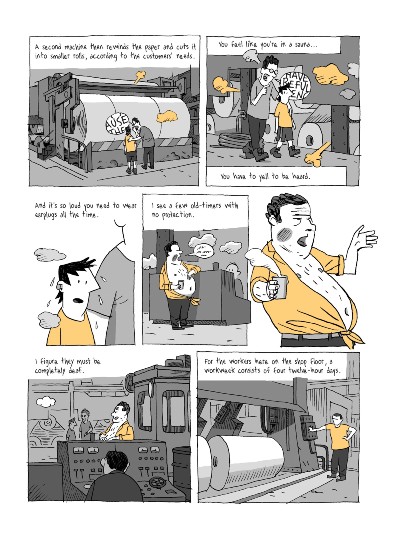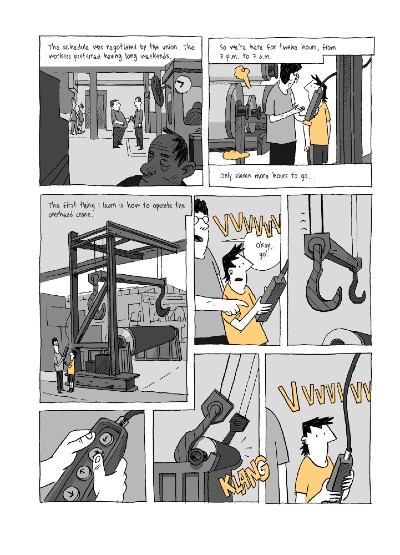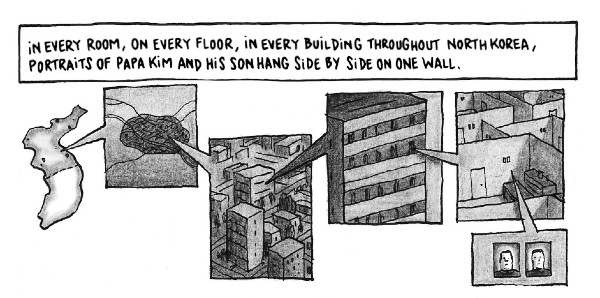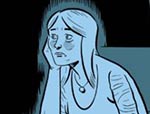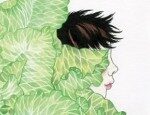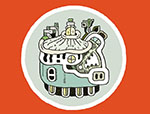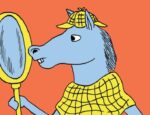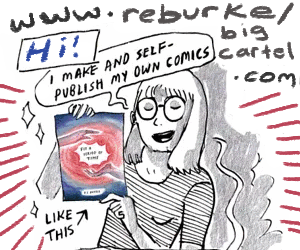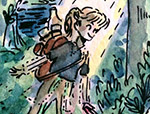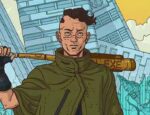Guy Delisle sounds exactly the way one imagines he would. The thought popped into my mind seconds after his quiet voice echoed on the phone from the South of France, a place he now calls home. It was the voice of someone who, one presumed, preferred hanging about at the back of a room during a party. There was something almost timorous about it, although that quality dissipated quickly in the face of a question.
We wanted to know about his latest book, Factory Summers, and why the period it is set in affected him as a young man. We also asked about the impact of Covid-19 on his work, and the place that inspired him most over his much-travelled life. Here are his responses.
(Read our review of Factory Summers from Drawn & Quarterly here at Broken Frontier)
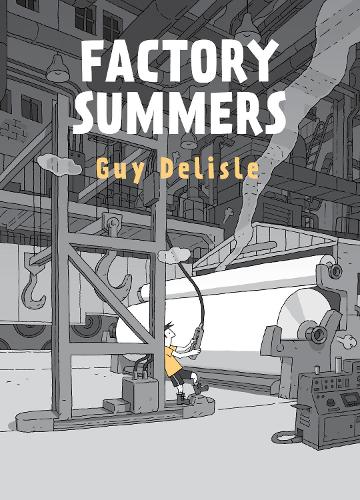
BROKEN FRONTIER: It’s obvious that your time at the factory all those years ago affected you deeply enough to make you want to create this book. What do you think made the most profound impact on you at the time?
GUY DELISLE: I guess it was my first summer job where I discovered what real work was. When you’re 16, you think your life can just be in a factory. You wonder whether you need to go to school after that, which was an interesting thing to see at an early age. It’s probably why it had that kind of effect on me.
BF: We have all been forced to re-evaluate how we see the world, in the aftermath of Covid-19. How has this period changed your approach as an artist?
DELISLE: For me and most of my colleagues who work in comic books, doing stories is independent work and we don’t need people around. It’s a lonely experience where you work at your table. I happen to be at a studio with people now, but it was fairly normal every day, in terms of my working hours. I had a chance not to be too bothered and was able to work. I brought my stuff home for a while, before eventually going back to the studio. I enjoyed some part of this whole experience, but am glad things are almost back to normal. The downside is I now have to answer tonnes of email (laughs) but I’m glad I enjoyed the quiet time before this.
BF: One of the nicest things about reading your books is how you refrain from making any direct comment on what you observe. Do family and friends reconcile this image with how you are in real life?
DELISLE: I think so. That is how I see myself. I am more like the person who enjoys doing sketches in a corner. When you draw, you take a close look at something and put it on paper. That is how I observe everything. It is the observation that I really like. The other part is the scientific part, which involves collecting information, then analysing it. I prefer to analyse things while looking at other people. I look at stuff and way I see things. From a subjective point of view, I don’t think there is a need to comment. I prefer describing and observing instead. That is what I want to convey in a book. In real life, I have a lot of doubts when I approach something, and that has worked for me. Before I say that I am 100 percent sure about something, I always go with not knowing, and that reflects in my comics.
BF: There is a class conflict in Factory Summers that is never resolved. The gap between rich and poor has only widened in the years since then. Are you angrier about this now than you were as a 16-year old, or there is a sense of resignation, the way so many people now feel?
DELISLE: The factory I was working in had workers who were well paid, because they were specialists at what they did. They were happy to be there. When I look back at the job, it was just noisy, and not something I wanted to be doing. The gap between engineers and workers exists, but this was in Canada, where access to education is easier and everyone has a chance, so I don’t feel that same sense of resignation. The only thing I would note is that the factory is closing because nobody reads paper anymore. It’s a culture that is fading away, so I’m glad I could talk about it in my book. The gap between rich and poor is still there, and there are huge companies with poorly paid workers, but some things don’t change. Comic books still exist, for instance. For me, at that paper factory level, those guys were very happy to be there, so I don’t feel that way.
BF: You are one of the better travelled cartoonists in the world today. What was the most interesting place you visited, in terms of how it inspired you to reach for a sheet of paper?
DELISLE: Obviously, I think of North Korea for a few reasons. It was the first time I began taking notes with the intention of doing a book. Before that, I had a short story that became a book, but being in North Korea and thinking about what the country has evolved into… things haven’t changed much; it’s still a crazy country. The fact that people outside didn’t know what was going on, and that people living there didn’t know what was going on outside, was crazy. I’ve been to Burma since then, and they still knew what was gong on outside their country. North Korea was unique in that sense. Nobody who visits it has the kind of freedom I had back then, to be able to walk the streets the way I did. It doesn’t happen to journalists or tourists. I had a special time in a special country there.
BF: What have you been reading during the lockdown, and is there anything you would like to recommend to us (apart from Factory Summers, of course?)
DELISLE: I’ve read the last Chris Ware book, Rusty Brown, which has been translated into French. I have also been reading work by Israeli and Japanese cartoonists. I have just been reading a lot of comics.
Buy Factory Summers online here
Review by Lindsay Pereira





